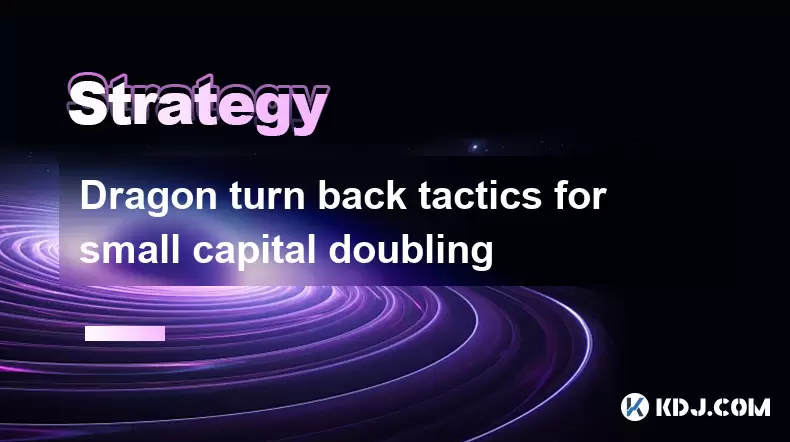-
 bitcoin
bitcoin $87959.907984 USD
1.34% -
 ethereum
ethereum $2920.497338 USD
3.04% -
 tether
tether $0.999775 USD
0.00% -
 xrp
xrp $2.237324 USD
8.12% -
 bnb
bnb $860.243768 USD
0.90% -
 solana
solana $138.089498 USD
5.43% -
 usd-coin
usd-coin $0.999807 USD
0.01% -
 tron
tron $0.272801 USD
-1.53% -
 dogecoin
dogecoin $0.150904 USD
2.96% -
 cardano
cardano $0.421635 USD
1.97% -
 hyperliquid
hyperliquid $32.152445 USD
2.23% -
 bitcoin-cash
bitcoin-cash $533.301069 USD
-1.94% -
 chainlink
chainlink $12.953417 USD
2.68% -
 unus-sed-leo
unus-sed-leo $9.535951 USD
0.73% -
 zcash
zcash $521.483386 USD
-2.87%
Dragon turn back tactics for small capital doubling
Dragon turn back tactics help traders double small capital by identifying reversal patterns in crypto markets, using technical analysis for effective trade execution and risk management.
Jun 09, 2025 at 01:57 pm

Introduction to Dragon Turn Back Tactics
Dragon turn back tactics are a popular strategy within the cryptocurrency trading community, particularly among traders looking to double their small capital investments. This approach involves identifying a 'dragon turn back' pattern, which is a specific price movement that signals a potential reversal. The idea is to capitalize on these reversals to achieve significant gains. This article will delve into the details of this strategy, explaining how to identify the pattern, execute trades, and manage risks effectively.
Understanding the Dragon Turn Back Pattern
The dragon turn back pattern is a technical analysis concept that traders use to predict a reversal in the price trend of a cryptocurrency. This pattern typically occurs after a significant price movement, where the price appears to 'turn back' like a dragon's tail. The pattern consists of several key components:
- A sharp upward or downward movement: This initial movement creates the 'dragon's body.'
- A retracement: Following the sharp movement, the price retraces, forming the 'dragon's tail.'
- A subsequent reversal: The price then reverses direction, completing the 'turn back.'
To identify this pattern, traders need to closely monitor price charts and use technical indicators such as moving averages, RSI, and Fibonacci retracement levels.
Setting Up for Dragon Turn Back Trades
Before executing a dragon turn back trade, it is crucial to set up your trading environment properly. Here are the steps to follow:
- Choose a reliable trading platform: Ensure that your chosen platform supports the cryptocurrency you wish to trade and offers the necessary charting tools.
- Set up your chart: Use a candlestick chart to clearly see the price movements. Adjust the time frame based on your trading strategy, whether it's short-term or long-term.
- Add technical indicators: Apply moving averages, RSI, and Fibonacci retracement levels to your chart to help identify potential dragon turn back patterns.
- Allocate your capital: Determine how much capital you are willing to risk on each trade, keeping in mind the potential for doubling your small capital.
Executing the Dragon Turn Back Trade
Once you have identified a potential dragon turn back pattern, follow these steps to execute your trade:
- Wait for confirmation: Ensure that the price has completed the retracement and is showing signs of reversing. Look for bullish or bearish candlestick patterns to confirm the reversal.
- Enter the trade: Place a buy order if you are expecting an upward reversal, or a sell order if you anticipate a downward reversal. Set your entry price at the point where the reversal is confirmed.
- Set your stop-loss: To manage risk, set a stop-loss order just below the lowest point of the retracement for a long position, or just above the highest point for a short position.
- Determine your take-profit level: Based on your analysis, set a take-profit order at a level where you expect the price to reach after the reversal.
Managing Risks in Dragon Turn Back Trades
Risk management is crucial when employing dragon turn back tactics, especially when aiming to double a small capital. Here are some key strategies to manage your risks effectively:
- Use proper position sizing: Only risk a small percentage of your total capital on each trade to avoid significant losses.
- Monitor your trades closely: Keep an eye on the market conditions and be prepared to adjust your stop-loss or take-profit levels as needed.
- Avoid overtrading: Stick to your trading plan and avoid the temptation to trade more frequently than necessary.
- Learn from your trades: Keep a trading journal to record your trades, analyze your performance, and identify areas for improvement.
Analyzing Past Trades for Improvement
To enhance your dragon turn back tactics, it is essential to analyze your past trades. This process involves:
- Reviewing your trade history: Look at each trade you have executed, focusing on the entry and exit points, the outcome, and any mistakes made.
- Identifying patterns: Determine if there are any recurring patterns in your trades that led to success or failure.
- Adjusting your strategy: Based on your analysis, make adjustments to your trading strategy to improve your chances of doubling your small capital.
- Continual learning: Stay updated with market trends and new trading techniques to refine your skills and adapt to changing market conditions.
FAQs
Q: Can dragon turn back tactics be used for all cryptocurrencies?A: While dragon turn back tactics can be applied to various cryptocurrencies, they are most effective in markets with high liquidity and volatility. It is essential to choose cryptocurrencies that have sufficient trading volume and price movement to generate clear dragon turn back patterns.
Q: How long does it typically take to see results from dragon turn back trades?A: The time frame for seeing results can vary depending on market conditions and the specific cryptocurrency being traded. Short-term traders may see results within days or weeks, while long-term traders might need to wait longer. Patience and consistent application of the strategy are key.
Q: What are the most common mistakes to avoid when using dragon turn back tactics?A: Common mistakes include entering trades too early without confirmation of the reversal, setting stop-losses too tight, and failing to manage risk properly. It is also crucial to avoid overtrading and to stick to a well-defined trading plan.
Q: Are there any specific tools or software recommended for identifying dragon turn back patterns?A: Traders often use charting platforms like TradingView or MetaTrader, which offer a range of technical indicators and drawing tools to help identify dragon turn back patterns. Additionally, some traders use specialized software that can automatically detect these patterns, but it is important to verify these signals manually.
Disclaimer:info@kdj.com
The information provided is not trading advice. kdj.com does not assume any responsibility for any investments made based on the information provided in this article. Cryptocurrencies are highly volatile and it is highly recommended that you invest with caution after thorough research!
If you believe that the content used on this website infringes your copyright, please contact us immediately (info@kdj.com) and we will delete it promptly.
- Spur Protocol ($SON) Gears Up for January Launch on Coinstore Amidst Market Cautions
- 2025-12-22 22:20:01
- XRP ETFs See Massive Inflows Amidst Price Drop: What's Really Going On?
- 2025-12-22 22:15:01
- UXLINK's Bold Buyback Bid: Can It Spark the Next Price Rally?
- 2025-12-22 21:50:01
- Washington Eyes Clarity: Congressional Bill Poised to Reshape Bitcoin and the Crypto Market
- 2025-12-22 21:50:01
- Gold & Silver Sparkle While Bitcoin Navigates Year-End Crossroads
- 2025-12-22 22:15:01
- MEXC Goes All-In: Universal 0-Fee Spot Trading Reshapes the Crypto Landscape
- 2025-12-22 18:40:01
Related knowledge

Why My "Gut Feeling" About Crypto Is Always Wrong.
Dec 07,2025 at 07:00am
Emotional Triggers in Market Participation1. Fear of missing out (FOMO) drives impulsive buys during sharp price surges, often right before a correcti...

How to Build a Crypto Strategy That Works Even When You're Wrong.
Dec 07,2025 at 10:19am
Understanding Market Cycles1. Cryptocurrency markets operate in distinct phases: accumulation, markup, distribution, and markdown. These phases repeat...

Did I Just Buy the Generational Top? A Checklist for Worried Investors.
Dec 17,2025 at 09:19am
Market Sentiment Indicators1. Bitcoin dominance has surged above 55% after a prolonged multi-month decline, signaling capital rotation away from altco...

The "One Last Trade" Fallacy: How to Stop Revenge Trading Your Crypto Losses.
Dec 19,2025 at 10:20am
The Psychology of the Final Attempt1. Traders often believe that one more trade—executed with heightened focus or adjusted parameters—will erase prior...

Why Is It So Easy to Lose Money and So Hard to Make It Back in Crypto?
Dec 19,2025 at 08:19am
Volatility Amplifies Losses1. Cryptocurrency markets routinely experience price swings of 20% or more within a single day, driven by sentiment shifts,...

Escaping the Loop: Buy, It Dips. Sell, It Rips. Here's the Solution.
Dec 14,2025 at 01:40pm
Psychological Traps in Market Timing1. Traders often misinterpret volatility as a signal rather than noise, leading to premature exits during normal r...

Why My "Gut Feeling" About Crypto Is Always Wrong.
Dec 07,2025 at 07:00am
Emotional Triggers in Market Participation1. Fear of missing out (FOMO) drives impulsive buys during sharp price surges, often right before a correcti...

How to Build a Crypto Strategy That Works Even When You're Wrong.
Dec 07,2025 at 10:19am
Understanding Market Cycles1. Cryptocurrency markets operate in distinct phases: accumulation, markup, distribution, and markdown. These phases repeat...

Did I Just Buy the Generational Top? A Checklist for Worried Investors.
Dec 17,2025 at 09:19am
Market Sentiment Indicators1. Bitcoin dominance has surged above 55% after a prolonged multi-month decline, signaling capital rotation away from altco...

The "One Last Trade" Fallacy: How to Stop Revenge Trading Your Crypto Losses.
Dec 19,2025 at 10:20am
The Psychology of the Final Attempt1. Traders often believe that one more trade—executed with heightened focus or adjusted parameters—will erase prior...

Why Is It So Easy to Lose Money and So Hard to Make It Back in Crypto?
Dec 19,2025 at 08:19am
Volatility Amplifies Losses1. Cryptocurrency markets routinely experience price swings of 20% or more within a single day, driven by sentiment shifts,...

Escaping the Loop: Buy, It Dips. Sell, It Rips. Here's the Solution.
Dec 14,2025 at 01:40pm
Psychological Traps in Market Timing1. Traders often misinterpret volatility as a signal rather than noise, leading to premature exits during normal r...
See all articles









































































